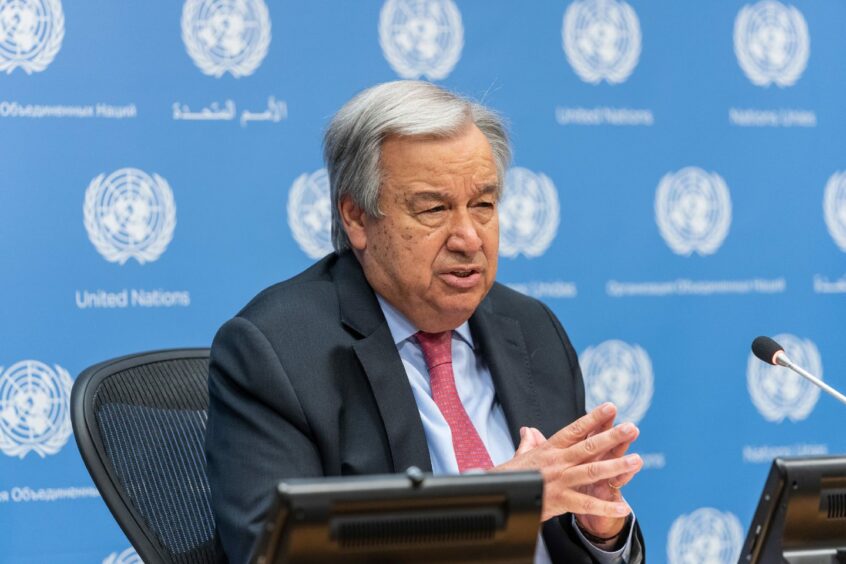
UN secretary-general Antonio Guterres called on Wednesday for a “windfall” tax on the profits of fossil fuel companies to help pay for the fight against global warming, calling them the “godfathers of climate chaos”.
In a bare-knuckled speech timed for World Environment Day, Mr Guterres, who has repeatedly spoken out about the threat of climate change, said that global emissions of carbon dioxide must fall 9% each year to 2030 for the 1.5C target to be kept alive.
His was speaking about the findings of the UN weather agency, which is predicting an 80% chance that average global temperatures will surpass the 1.5C target laid out in the landmark Paris climate accord within the next five years.
The World Meteorological Organisation (WMO) said on Wednesday that the global mean near-surface temperature for each year from 2024 to 2028 is expected to range between 1.1C and 1.9C hotter than at the start of the industrial era.
With time running out to reverse course, Guterres urged a 30% cut in global fossil fuel production and use by 2030.
“We need an exit ramp off the highway to climate hell,” he said, adding: “The battle for 1.5 degrees will be won or lost in the 2020s.”
The latest climate data show that the world is “way off track” from its goal of limiting warming to 1.5 C, WMO Deputy Secretary-General Ko Barrett said.
Cooling effect only temporary
“We must urgently do more to cut greenhouse gas emissions, or we will pay an increasingly heavy price in terms of trillions of dollars in economic costs, millions of lives affected by more extreme weather, and extensive damage to the environment and biodiversity,” Barrett said.
Barrett described the cooling effect of La Nina weather conditions, which are expected to take hold later this year, as “a mere blip in the upward curve” in the heat felt across the globe.
“We all need to know that we need to reverse this curve and we need to do it urgently,” she said.
While last year registered as the warmest calendar year on record at 1.45 C (2.61 F) above pre-industrial temperatures, at least one of the next five years is likely to be even warmer than 2023, the WMO data show.
Ice loss shock
Scientists at the Copernicus Climate Change Service said there were some surprising developments – such as the steep loss of Antarctic sea ice in recent months – but that the overall climate data were in line with projections of how rising greenhouse gas emissions would heat the planet.
“We have not seen anything like this in the last several thousand years,” said Copernicus director Carlo Buontempo.
Guterres took aim at fossil fuel companies.
“The Godfathers of climate chaos – the fossil fuel industry – rake in record profits and feast off trillions in taxpayer-funded subsidies,” he said.
Drawing a comparison with many governments’ restrictions on advertising for harmful substances like tobacco, he said, “I urge every country to ban advertising from fossil fuel companies, and I urge news media and tech companies to stop taking fossil fuel advertising.”
Urgent action
The scientific community has repeatedly warned that warming of more than 1.5°C risks unleashing far more severe climate change impacts and extreme weather and every fraction of a degree of warming matters.
Even at current levels of global warming, there are already devastating climate impacts. These include more extreme heatwaves, extreme rainfall events and droughts; reductions in ice sheets, sea ice, and glaciers; accelerating sea level rise and ocean heating.
Buontempo said there was still time to change tack.
“We are living in unprecedented times, but we also have unprecedented skill in monitoring the climate and this can help inform our actions,” he said.
“This string of hottest months will be remembered as comparatively cold but if we manage to stabilise the concentrations of greenhouse gases in the atmosphere in the very near future we might be able to return to these ‘cold’ temperatures by the end of the century.

